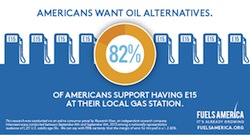 A couple of companies familiar to Domestic Fuel readers are being mentioned as the future of algae-based biodiesel. This article from the Voice of America (VOA) talks about how the partnership between renewable fuel marketer Propel Fuels and algae-biodiesel maker Solazyme, both based in Northern California, is advancing the role algae-based biodiesel is having.
A couple of companies familiar to Domestic Fuel readers are being mentioned as the future of algae-based biodiesel. This article from the Voice of America (VOA) talks about how the partnership between renewable fuel marketer Propel Fuels and algae-biodiesel maker Solazyme, both based in Northern California, is advancing the role algae-based biodiesel is having.
“It all starts in the lab where what we do is we grow a proprietary strain of algae that are actually optimized to produce an oil that is a perfect oil, an algae oil, to make into fuel,” [Bob Ames, Solazyme’s vice president in charge of fuels] said.
To test its marketability, Propel installed algae-based fuel pumps at four of its seven stations in the San Francisco Bay area. It was the first time Solazyne’s new biodiesel was offered to the public. The companies were pleased to see a 35 percent increase in biodiesel sales over the month-long test-run.
“Basically, it was offered at exactly the same price as the competing fuel, and what consumers told us by buying more of it is that they were willing to buy it because of the better environmental benefits,” Ames said.
The article goes on to talk about the economies of scale algae-based biodiesel must reach to be profitable. The companies seem to be on the right track, as Solazyme has a plant in Illinois and another smaller one in California (plus a third even larger plant to be opened in Brazil) that are producing large quantities of algae oil, while Propel seems to have the best means of marketing this particular niche of the green fuel.










